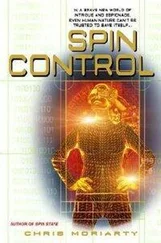He blinked. “I saw it.”
“You—that’s a dream. A nightmare. It didn’t happen.”
“How do you know?”
“Because… I just do, that’s all. Sweet Jesus!” Li closed her eyes and tried to still the spinning of the room around her.
“You love him,” Cohen said after a minute or two.
“I don’t even remember him.”
“Even so.”
She shook her head again. The noise kept drumming on her ears. Like rainwater running down a spout. Like standing in a crowded room full of people speaking a foreign language.
“So.” Cohen spoke slowly, as if he were thinking through a complex equation. “How do you keep straight what’s a dream and what’s not?”
“Don’t you dream? I thought all sentients dreamed.”
“Not like that.” He looked horrified. “If I think it, even when I’m asleep, it happened. Exactly the way I remember it. But your brain just… lied to you.”
“Cohen,” Li asked, as the hum inside her head climbed to a higher, more urgent pitch, “how did you see that dream?”
The violet eyes sparkled. “I’ll give you three guesses.”
She started to answer, but the noise in her skull exploded, drowning out every thought but pain. She grabbed her head and curled into fetal position on the narrow bed. Red spots swam before her eyes, hemorrhaged, flooded her vision. The buzzing rose to a high wail. Her sight tunneled down to a pinprick of light, blacked out altogether. “Hush,” he said, bending over her.
Slowly the wail trailed off to a low moan and her vision cleared. “What the hell was that?” she panted.
“Traffic.” She heard him stand up and cross the room, heard running water, felt the cool touch of water as he wiped a damp cloth across her forehead.
Traffic?
“Comm traffic. Mine. You’re hearing me.”
“No,” she whispered. “Something’s wrong, Cohen.”
“Nothing’s wrong. Korchow’s had me running tests all morning. Accessing your internals, running checks, startup subroutines, downloading data. Your commsys is a dinosaur, by the way. A disgrace. I ran a Schor check on your oracle workspace though. Properly. Which those idiots at Alba never do. That should help a bit.”
She opened her eyes to find him smiling down at her. “Feeling better now?”
She had to think about it for a moment. “Yes.”
“Hmm.”
“What does that mean? Am I adjusting?”
“No. I just took the intraface off-line.”
They looked at each other. “Oh,” Li said.
Cohen stood up, patting her hand. “Don’t worry. You’re still barely conscious. We’ll get on top of it tomorrow.”
* * *
But they didn’t get on top of it the next day. Or the day after that. Korchow had set up a lab and medical facility in the safe house, and over the next three days, Li’s universe narrowed to two sterile rooms of monitoring equipment, her own cramped bunk, and the empty echoing dome that functioned as the safe house’s common room.
The first time they brought the intraface on-line, she ended up curled on the floor, hands over her ears, screaming for someone—anyone—to turn it off. Cohen shut the link down so fast it took him half an hour to get himself straightened out.
“I’ll go crazy,” Li said when she’d recovered enough to speak. “It’s like a hundred people fighting in my head.”
“Forty-seven,” Cohen interjected. “Well, this week.”
“What’s gone wrong?” Korchow asked Cohen. He didn’t even look at Li, just talked past her like she was a piece of tech.
“Nothing,” Cohen answered, tapping a fingernail on the console in front of him. “It’s an organic software problem.”
Cohen was shunting through Ramirez, and Li noticed again the cold fire in Leo’s dark eyes, the extra measure of decisiveness in his already-powerful movements. Those two I’d like to have next to me in a fight, she thought—and felt a sudden razor-sharp stab of grief for Kolodny.
“Sharifi didn’t have these problems,” Korchow said, a threat lurking behind the words.
Cohen shrugged. “She wouldn’t have, would she? She was interfacing with a simple field AI. And she wasn’t wired for anything but communications. Catherine’s a different beast entirely. You try to crowbar new programs into a military system and all bets are off. You knew that before we started.”
“Well, what do we do about it?” Li asked.
Cohen crossed the room more quickly than Li would have thought Ramirez could move. He leaned over and put a cool hand to her forehead. “You don’t do anything. You get your pulse rate down and go to bed. I’ll figure out where we go from here.”
But the next session was worse. After three hours Li collapsed into a chair, pressing the heels of her hands into her burning eye sockets. “I can’t. I can’t do it again.”
“Yes you can,” Korchow said. He was still being patient. “Why didn’t the pulse compression work?” he asked Cohen over her head.
“If I knew, I’d be able to fix it.”
“Does she need a new signal processor?”
Li didn’t have to see Cohen to imagine his dismissive shrug.
“Well, what then?”
Cohen shook his head. “I have to think.”
“Let’s check the settings and try it again.”
Li wanted to say no. That she’d throw up if they tried again. That everything she’d eaten in the last two days had come up already, and she couldn’t stand it anymore. But she was too sick and too tired to say anything.
It was Cohen who finally came up with the idea of the memory palace. He was shunting through Arkady when he explained it to her, and his excitement set the construct’s dark eyes glinting like freshly fired coal. “It’s an organic problem,” he explained. “We’re trying to integrate AI-scale parallel-processing nets with an organic system that was already obsolete the first time a person put pen to paper. So. If we can’t fight it, we work with it. We try one of the oldest tricks there is—Matteo Ricci’s trick. We build you a memory palace.” Arkady’s lips twisted into a wry smile. “Or rather, we give you the keys to mine.”
It took him twenty hours to put the keys together. Hours she slept through in a desperate attempt to hoard her energy for their final push. It was late morning of the third day after her awakening when she lay down on the couch Arkady had dragged into the lab for her, closed her eyes, jacked in, and found herself alone in a featureles white room.
“You may have to hunt for the door a bit,” Cohen said at her shoulder. “I haven’t quite got that sorted out yet.” He had a smaller, thinner feeling than usual, she thought. And when she looked around, sure enough, there was Hyacinthe, shoes slung over his shoulders, standing a hair shorter than her in his socks. “The door,” he said insistently.
She turned and saw a gleaming, intricately carved mahogany door. More of a window than a door, really; its sill was set into the wall at about knee level, and even Li had to duck her head to clear the lintel.
“Go on,” Cohen said.
It was so bright on the other side that it took a moment for her eyes to clear. She stood in a five-cornered courtyard. Arcades bright with mosaics surrounded her. Beyond the walls she glimpsed the knife-edged mountains of a dry country.
She heard the sound of running water and felt cold spray on her face before she saw the fountain. The water poured from a shallow stone shelf as if rising from a spring and riffled down a long sloping stair that ran to the other end of the great courtyard. Li followed the water’s course down to a shadowy portico whose mosaics glinted like eyes in the occasional stray sunbeam. The watercourse ended in a narrow reflecting pool that emptied mysteriously into who knew what. Li stepped across the pool and walked along the portico, her heels clicking on the pavement. She came to a door and opened it.
Читать дальше












